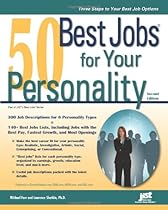50 Best Jobs for Your Personality |
| List Price: | $17.95 |
| Price: | $11.39 & eligible for FREE Super Saver Shipping on orders over $25. Details |
Availability: Usually ships in 24 hours
Ships from and sold by Amazon.com
67 new or used available from $5.67
Average customer review:(3 customer reviews)
Product Description
Research has proven that matching your personality to a career brings work satisfaction and success. With this best-selling book's help, you discover your personality type and the 50 best jobs that relate to it. Part I overviews how personality relates to careers. Part II features a self-assessment for determining you personality type: Realistic, Investigative, Artistic, Social, Enterprising or Conventional. Part III contains the best job lists, including the 50 best jobs overall for each personality type. Other lists for each personality type include the best-paying jobs, jobs with the highest projected growth, best jobs based on education lever, best part-time jobs, and best jobs for the self-employed--145 best jobs lists in all. In Part IV, you find a gold mine of facts about the 50 best jobs for each of the six personality types & 300 job descriptions.
- Amazon Sales Rank: #196562 in Books
- Published on: 2009-04
- Original language: English
- Number of items: 1
- Dimensions: 1.02" h x 7.32" w x 9.17" l, 1.52 pounds
- Binding: Paperback
- 484 pages
About the Author
Michael Farr has been teaching, writing, and developing his job search techniques for over 20 years. He has written dozens of books that have sold over 2 million copies. Mike emphasizes practical, results-oriented methods that have been proven to reduce the time it takes to find a job. His commonsense advice has made his books the most widely used in job search programs.
Laurence Shatkin has 30 years in the career information field, presents and blogs on career issues, and is the author of many best-selling books. Dr. Shatkin is sought after by the media for his expertise on occupations and appears regularly on national news programs. He has appeared on CBS Evening News with Katie Couric, the Fox Business Network, ABC News Now, CBS Newspath, NPR, and in many other TV and radio shows. He has been quoted in The Washington Post, The Chicago Tribune, Associated Press, Men's Health, Forbes, and many other major publications.
Most helpful customer reviews
1 of 1 people found the following review helpful.![]() Very informative
Very informative
By Amanda
What I like about this book is that it gives a ton of careers at the end and explains what the work will be like and other necessary information, like salary and whether promotions are likely. However, if you are looking for exact careers based upon your personality type, this book is more a general overview of what would be good based on whether you're conventional, realistic, artistic, ect. For people who have absolutely no idea what career they might enjoy, buy this book.
1 of 1 people found the following review helpful.![]() Hype
Hype
By Deborah Stewart
I found this book to be too technical, too much information that really does not help a job seeker drill down a new or existing career.
0 of 2 people found the following review helpful.![]() Oversimplistic and misguided in some descriptions
Oversimplistic and misguided in some descriptions
By mchavez
I had the opportunity to peruse this book last week. I have to point out to a couple of glaring errors.
On page 260, under Interpreters and Translators, AS (Artistic Social) is the personality code assigned to this field. The conceptual error I am referring to is that interpreters and translators are treated as one and the same, or as two expressions of the same profession. Nothing can be more inaccurate! Interpreters deal with the spoken word, whereas translators work with the printed or written word. The skill sets for each career track are very different and go beyond a knowledge of foreign languages. Interpreters are not always required to write well, like translators are, but an interpreter has to be quick on his feet and have the power of brevity -mainly, to express in as few words as possible what the speaker is telling his audience. Conversely, a translator has to be concise but comprehensive in his delivery: he has to pay attention to all the meanings because there's more time to write them down, unlike an interpreter, who has higher time constraints.
Another error is in the education/training required. The authors put "long-term on-the-job training". That may be true for some interpreters. Most hospital interpreters have to undergo and pass a certification examination, although many health care interpreters work for years without any kind of certification or formal training. Many universities (Boston University, College of Charleston, Florida International University, New York University, to name a few) have courses in community and court interpreting. Sadly, interpreters for the deaf are lumped together without much regard to the intensive training they have to undergo.
The basis for my critique is my 18 years as a professional translator in the United States and my network of translators, interpreters, editors and translation company owners.
The damage caused by these very serious inaccuracies is immense and perpetuates many stereotypes about interpreters and translators. If I didn't know any better, anyone with high school French or Spanish could say "I can be an interpreter! I don't need a degree."
As for personality types, the authors probably haven't interviewed many translators.
http://astore.amazon.com/amazon-book-books-20/detail/1593576579
| Magazine Subscriptions | Books | Kindle Store |

No comments:
Post a Comment